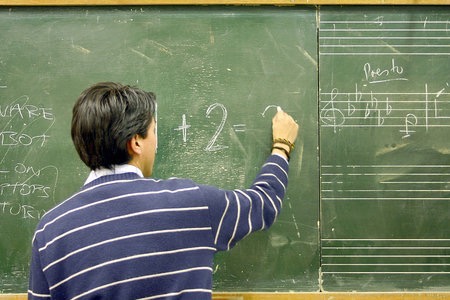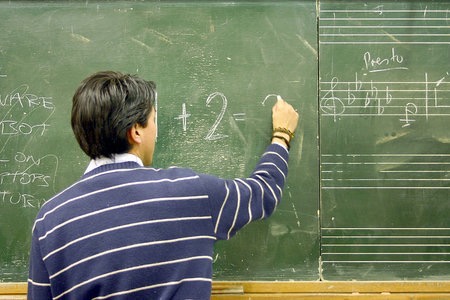*
Tôi là một giáo viên.
I am a teacher.
Ich bin ein Lehrer.
Soy profesor.
Je suis un enseignant.
Sono un insegnante.
ฉันเป็นครู.
나는 선생님이다.
我是老師。
我 是 老师 。 *
Cô giáo đang đứng sau lưng anh.
The teacher is standing behind him.
Die Lehrerin steht hinter ihm.
El profesor está de pie detrás de él.
Le professeur se tient derrière lui.
L'insegnante è in piedi dietro di lui.
ครูยืนอยู่ข้างหลังเขา
선생님은 그의 뒤에 서 있었다.
老師站在他身後。
老师 站 在 他 身后 。 *
Cô ấy muốn trở thành một giáo viên.
She wants to become a teacher.
Sie will Lehrerin werden.
Quiere ser profesora.
Elle veut devenir professeur.
Vuole diventare un'insegnante.
เธออยากเป็นครู
그녀는 교사가 되고 싶어합니다.
她想當老師。
她 想 当 老师 。 *
Cô giáo dạy tiếng Anh cho chúng tôi.
The teacher teaches English to us.
Der Lehrer bringt uns Englisch bei.
El profesor nos enseña inglés.
Le professeur nous enseigne l'anglais.
L'insegnante ci insegna l'inglese.
ครูสอนภาษาอังกฤษให้เรา
선생님은 우리에게 영어를 가르쳐 주십니다.
老師教我們英文。
老师 教 我们 英文 。 *
Cô ấy chỉ là một giáo viên dạy thay.
She is just a substitute teacher.
Sie ist nur eine Vertretungslehrerin.
Sólo es una profesora sustituta.
Elle n'est qu'un professeur remplaçant.
È solo un'insegnante sostitutiva.
เธอเป็นเพียงครูสอนแทน
그녀는 대체 교사입니다.
她是代課老師。
她 是 代课老师 。 *
Cô giáo đang dạy toán cho chúng tôi.
The teacher is teaching us math.
Der Lehrer unterrichtet uns in Mathematik.
El profesor nos está enseñando matemáticas.
Le professeur nous apprend les maths.
L'insegnante ci sta insegnando la matematica.
ครูกำลังสอนคณิตศาสตร์ให้เรา
선생님은 우리에게 수학을 가르칩니다.
老師教我們數學。
老师 教 我们 数学 。 *
Cô ấy là giáo viên của chúng tôi.
She is our teacher.
Sie ist unsere Lehrerin.
Es nuestra profesora.
Elle est notre professeur.
Lei è la nostra insegnante.
เธอเป็นครูของเรา
그녀는 우리 선생님입니다.
她是我們的老師。
她 是 我们 的 老师 。 *
Giáo viên rất dễ tính.
The teacher is very easygoing.
Der Lehrer ist sehr locker.
El profesor es muy fácil.
Le professeur est très facile à vivre.
L'insegnante è molto accomodante.
อาจารย์พูดง่ายมากๆ
나이 든 교사는 접근하기 쉽습니다.
這位老教師平易近人。
这位 老 教师 平易近人 。 *
Tôi dạy ở trường tiểu học này.
I teach at this primary school.
Ich unterrichte in dieser Grundschule.
Doy clases en esta escuela primaria.
J'enseigne dans cette école primaire.
Insegno in questa scuola elementare.
ฉันสอนที่โรงเรียนประถมแห่งนี้
저는 이 초등학교에서 가르칩니다.
我在這所小學任教。
我 在 这 所 小学 任教 。 *
Cô giáo dạy chúng tôi đọc thuộc lòng các từ.
The teacher teaches us to recite the words.
Der Lehrer bringt uns bei, die Worte nachzusprechen.
El profesor nos enseña a recitar las palabras.
Le professeur nous apprend à réciter les mots.
L'insegnante ci insegna a recitare le parole.
ครูสอนให้เราท่องคำศัพท์
선생님은 우리에게 단어 암송을 가르쳤습니다.
老師教我們背誦單詞。
老师 教 我们 背诵 单词 。 *
Các giáo viên và học sinh rất tốt với nhau.
The teachers and students get on well with each other.
Die Lehrer und Schüler verstehen sich gut miteinander.
Los profesores y los alumnos se llevan bien.
Les professeurs et les élèves s'entendent bien.
Gli insegnanti e gli studenti vanno d'accordo tra loro.
ครูและนักเรียนเข้ากันได้ดี
선생님과 학생들이 아주 잘 어울립니다.
老師和學生相處得很好。
老师 和 学生 相处 得 很 好 。 *
Mọi người đang sao chép các động tác của giáo viên.
Everyone is copying the teacher's movements.
Alle üben, indem sie die Bewegungen des Lehrers nachahmen.
Todos están copiando los movimientos del maestro.
Ils copient tous les mouvements du professeur.
Stanno tutti copiando i movimenti dell'insegnante.
พวกเขาทั้งหมดกำลังเลียนแบบการเคลื่อนไหวของครู
모두 선생님의 동작을 따라 연습합니다.
大家仿效老師的動作來練習。
大家 仿效 老师 的 动作 来 练习 。 *
Cô giáo đã dạy bọn trẻ một bài học.
The teacher taught the children one lesson.
Der Lehrer brachte den Kindern eine Lektion bei.
El profesor dio una lección a los niños.
Le professeur a donné une leçon aux enfants.
L'insegnante ha dato una lezione ai bambini.
ครูสอนบทเรียนให้เด็กๆ
선생님은 아이들에게 교훈을 주었습니다.
老師給孩子們上了一堂課。
老师 给 孩子 们 上 了 一堂课 。 *
Hôm nay cô giáo sẽ dạy chúng ta phép trừ.
The teacher will teach us subtraction today.
Der Lehrer wird uns heute Subtraktion beibringen.
El profesor nos enseñará hoy a restar.
Le professeur va nous apprendre les soustractions aujourd'hui.
L'insegnante ci insegnerà la sottrazione oggi.
วันนี้ครูจะสอนการลบ
선생님은 오늘 우리에게 뺄셈을 가르쳤습니다.
老師今天教我們減法。
老师 今天 教 我们 减法 。 *
Các học sinh đã chơi một trò lừa giáo viên của họ trong giờ học.
The students play a trick on their teacher during class.
Die Schüler spielen ihrem Lehrer während des Unterrichts einen Streich.
Los alumnos le han gastado una broma a su profesor durante la clase.
Les élèves ont joué un tour à leur professeur pendant le cours.
Gli studenti hanno giocato uno scherzo al loro insegnante durante le lezioni.
นักเรียนเล่นกลกับครูของพวกเขาระหว่างเรียน
학생들은 수업시간에 선생님을 놀렸다.
學生們在課堂上戲弄老師。
学生 们 在 课堂 上 戏弄 老师 。 *
Giáo viên đang dạy chúng tôi một số từ mới.
The teacher is teaching us some new words.
Der Lehrer bringt uns einige neue Wörter bei.
El profesor nos está enseñando algunas palabras nuevas.
Le professeur nous apprend de nouveaux mots.
L'insegnante ci sta insegnando alcune nuove parole.
ครูกำลังสอนคำศัพท์ใหม่ให้เรา
선생님은 우리에게 새로운 단어를 가르쳐 주셨습니다.
老師教我們新單詞。
老师 教 我们 新 单词 。 *
Cô giáo đang dạy một lớp học.
The teacher is teaching a class.
Die Lehrerin unterrichtet eine Klasse.
El profesor está dando una clase.
Le professeur enseigne à une classe.
L'insegnante sta insegnando a una classe.
ครูกำลังสอนชั้นเรียน
선생님이 가르치고 있습니다.
老師在授課。
老师 在 授课 。 *
Học sinh nên tôn trọng giáo viên của mình.
Students should respect their teachers.
Die Schüler sollten ihre Lehrer respektieren.
Los alumnos deben respetar a sus profesores.
Les élèves doivent respecter leurs professeurs.
Gli studenti dovrebbero rispettare i loro insegnanti.
นักเรียนควรเคารพครูของตน
학생들은 선생님을 존경해야 합니다.
學生要尊敬老師。
学生 要 尊敬老师 。 *
Tôi sẽ đến thăm giáo viên của tôi.
I am going to visit my teacher.
Ich werde meinen Lehrer besuchen.
Voy a visitar a mi profesor.
Je vais rendre visite à mon professeur.
Vado a trovare la mia insegnante.
ฉันจะไปเยี่ยมอาจารย์
선생님을 만나러 갔습니다.
我去拜訪老師。
我 去 拜访 老师 。 *
Cô giáo đã đệm đàn piano cho tôi.
My teacher accompanied me on the piano.
Mein Lehrer begleitete mich am Klavier.
Mi profesor me acompaña al piano.
Mon professeur m'a accompagné au piano.
Il mio insegnante mi ha accompagnato al pianoforte.
ครูของฉันพาฉันเล่นเปียโน
선생님은 저를 위해 피아노 반주를 연주해 주셨습니다.
老師為我進行鋼琴伴奏。
老师 为 我 进行 钢琴伴奏 。 *
Cô học trò bày tỏ sự cảm ơn chân thành đến cô giáo.
The student expressed her heartfelt thanks to the teacher.
Die Schülerin bedank sich herzlich bei der Lehrerin.
La alumna expresó su más sincero agradecimiento al profesor.
L'étudiante a exprimé ses remerciements les plus sincères à son professeur.
La studentessa ha espresso il suo sentito ringraziamento all'insegnante.
นักเรียนแสดงความขอบคุณอย่างจริงใจต่อครู
학생들은 선생님께 감사의 마음을 전했습니다.
學生對老師表示由衷的感謝。
学生 对 老师 表示 由衷 的 感谢 。 *
Mọi người đều bắt chước hành động của cô giáo.
Everyone imitates the movements of the teacher.
Alle ahmen die Bewegungen des Lehrers nach.
Todos imitan las acciones del maestro.
Tout le monde imite les actions de l'enseignant.
Tutti imitano le azioni dell'insegnante.
ทุกคนเลียนแบบการกระทำของครู
모두가 선생님의 행동을 모방하고 있습니다.
大家在模仿老師的動作。
大家 在 模仿 老师 的 动作 。 *
Chú tôi đang dạy tôi bơi.
My uncle is teaching me to swim.
Mein Onkel bringt mir das Schwimmen bei.
Mi tío me está enseñando a nadar.
Mon oncle m'apprend à nager.
Mio zio mi sta insegnando a nuotare.
ลุงกำลังสอนฉันว่ายน้ำ
삼촌은 나에게 수영하는 법을 가르쳐 주었다.
伯父教我學游泳。
伯父 教 我 学 游泳 。 *
Giáo viên cảm thấy vui vì học sinh đang làm việc chăm chỉ.
The teacher feels happy that the students are working hard.
Die Schüler arbeiten fleißig, und der Lehrer ist sehr zufrieden.
El profesor se alegra de que los alumnos se esfuercen.
Le professeur est heureux que les élèves travaillent dur.
L'insegnante è felice che gli studenti stiano lavorando sodo.
ครูรู้สึกมีความสุขที่นักเรียนทำงานหนัก
학생들은 열심히 일했고 선생님은 매우 기뻐했습니다.
學生很努力,老師很欣慰。
学生 很 努力 , 老师 很 欣慰 。 *
Giáo viên yêu cầu trẻ đọc to tác phẩm của mình.
The teacher asks her to read her composition aloud.
Die Lehrerin bittet sie, ihren Aufsatz laut vorzulesen.
El profesor le pide que lea su redacción en voz alta.
L'enseignant lui demande de lire sa rédaction à haute voix.
L'insegnante le chiede di leggere il suo saggio ad alta voce.
ครูขอให้เธออ่านออกเสียงองค์ประกอบของเธอ
선생님은 그녀에게 그녀의 작곡을 소리 내어 읽어 달라고 요청했습니다.
老師要求她朗讀她的作文。
老师 要求 她 朗读 她 的 作文 。 *
Giáo viên rất nghiêm khắc với tôi.
The teacher is very strict with me.
Der Lehrer ist sehr streng mit mir.
El profesor es muy estricto conmigo.
Le professeur est très strict avec moi.
L'insegnante è molto severo con me.
อาจารย์เข้มงวดกับฉันมาก
선생님은 나에게 매우 엄격하다.
老師對我很嚴厲。
老师 对 我 很 严厉 。 *
Các tín đồ tuân theo lời dạy của linh mục.
The believers follow the priest’s teachings.
Die Gläubigen folgen den Lehren des Priesters.
Los creyentes siguen las enseñanzas del sacerdote.
Les croyants suivent les enseignements du prêtre.
I credenti seguono il sacerdote è insegnamenti.
ผู้เชื่อปฏิบัติตามคำสอนของพระสงฆ์
신자들은 사제의 가르침을 따른다.
教徒遵循神父的教導。
教徒 遵循 神父 的 教导 。 *
Giáo viên rất tức giận trước hành vi của em ấy.
The teacher is angry at her behavior.
Der Lehrer ist empört über ihr Verhalten.
La profesora está indignada por su comportamiento.
Le professeur est indigné par son comportement.
L'insegnante è indignata per il suo comportamento.
ครูไม่พอใจพฤติกรรมของเธอ
선생님은 그녀의 행동에 분개했습니다.
老師對她的行為感到憤慨。
老师 对 她 的 行为 感到 愤慨 。 *
Học sinh giỏi nhận được lời khen từ giáo viên của họ.
Good students receive praise from their teacher.
Gute Schüler werden von ihrem Lehrer gelobt.
Los buenos estudiantes reciben elogios de su profesor.
Les bons élèves reçoivent des éloges de leur professeur.
I bravi studenti ricevono lodi dal loro insegnante.
นักเรียนดีได้รับคำชมจากอาจารย์
좋은 학생은 교사로부터 칭찬을 받습니다.
好學生受到老師的稱贊。
好 学生 受到 老师 的 称 赞 。 *
Những người thầy đáng được khen ngợi.
Teachers deserve praise and respect.
Lehrern gebührt Lob und Respekt.
Los profesores merecen ser alabados.
Les enseignants méritent d'être félicités.
Gli insegnanti meritano di essere lodati.
ครูสมควรได้รับการยกย่อง
선생님은 칭찬받아 마땅합니다.
教師值得人們的歌頌。
教师 值得 人们 的 歌颂 。 *
Cô giáo đang lên cơn.
The teacher is having a fit.
Der Lehrer hat einen Anfall.
El profesor tiene un ataque.
Le professeur fait une crise.
L'insegnante sta avendo un attacco.
อาจารย์กำลังฟิตพอดี
선생님은 이성을 잃어가고 있습니다.
老師在發脾氣。
老师 在 发脾气 。 *
Cô giáo đang dạy bọn trẻ những câu chuyện đằng sau những câu tục ngữ.
The teacher is teaching the children the stories behind proverbs.
Der Lehrer bringt den Kindern die Geschichten hinter den Sprichwörtern bei.
El maestro les está enseñando a los niños las historias detrás de los proverbios.
L'enseignant enseigne aux enfants les histoires derrière les proverbes.
L'insegnante sta insegnando ai bambini le storie dietro i proverbi.
ครูกำลังสอนเด็กถึงเรื่องราวเบื้องหลังสุภาษิต
선생님은 아이들에게 속담을 들려주고 있습니다.
老師在為孩子講諺語故事。
老师 在 为 孩子 讲 谚语 故事 。
| |
|
| SAIGONESE |
|---|
| B01 | *  cô cô |  I, you (female teacher) I, you (female teacher) |  Ich, Sie (Lehrerin) Ich, Sie (Lehrerin) |
|
| B03 | *  giáo viên giáo viên |  teacher teacher |  Lehrer Lehrer |
|
| E045 | *  cô giáo cô giáo |  female teacher female teacher |  Lehrerin Lehrerin |
|
| E162 | *  cô giáo cô giáo |  teacher teacher |  Lehrer Lehrer |
|
| I124 | *  chỉ chỉ |  show, teach show, teach |  zeigen, lehren zeigen, lehren |
|
| I020 | *  dạy… một bài học dạy… một bài học |  teach someone a lesson teach someone a lesson |  jemandem eine Lektion erteilen jemandem eine Lektion erteilen |
|
744 先生: teacher: I want to become a Japanese teacher. 772 教える: teach, tell: He teaches mathematics. 773 教師: teacher, instructor: He's a high school teacher. 802 数学: mathematics: My big brother's a math teacher. 1112 父親: father: His father is a teacher. 1500 お宅: (someone else's) home: Which is the teacher's house? 1610 招待: invitation: I invited my high school teacher to the wedding. 1633 夢: dream: My dream is to become a teacher. 1741 じっと: without moving, still: The pupil was listening attentively to the teacher. 2092 下さる: give (honorific): The teacher gave me a letter. 2102 やり方: way of doing: Please teach me how to do the job. 2435 道徳: morality, ethic: I'd like to properly teach ethics to my children. 2807 手軽: simple and convenient, easy-to-do: Please teach me some easy-to-prepare dishes. 2844 受け持つ: be in charge of, teach: I teach the first graders. 2869 生け花: flower arrangement: She is a flower arrangement teacher. 2927 教員: teacher, faculty staff: He's a high school teacher. 2956 引き出す: draw out, bring out: The teacher drew out the best of my ability. 3731 反発: rebelling, backlash: He was rebelling against the teacher. 3806 平等: equal, fair: That teacher treats all students equally. 4008 資格: qualifications, competence: I want to get a license to teach Japanese. 4100 雑談: chat, idle talk: The teacher always chats before the class. 4250 採点: marking, grading: It seems that the teacher has finished grading the exams. 4534 観測: observation: The teacher took us to observe the stars. 4605 周り: vicinity, surroundings: Gather around the teacher. 4930 月謝: monthly fee: Did you give the monthly fee to the teacher? 4951 導く: guide, lead: The teacher guides us. 5090 おかげ: with the help of, thanks to: Thanks to the teacher, I was able to pass the college entrance exam. 5159 言葉遣い: wording, language: Do not speak to your teacher like that. 5304 許可: permission, approval: I got permission from the teacher and went home early. 5553 忠告: advice, warning: You should follow your teacher's advice. 5647 礼: bow, thanks: I wrote a thank-you letter to my teacher. 5658 仏: Buddha, Buddhist image: I studied the teachings of Buddha. 5871 暑中見舞い: summer greeting: I sent a summer greeting card to my teacher. 6093 お気に入り: favorites: She is the teacher's favorite. 6202 中道: golden mean; middle road: Moderation is one of the teachings of Buddhism. 6341 報いる: recompense; requite: I want to repay the teacher's kindness. 7001 弟子: disciple; pupil: My calligraphy teacher has more than 100 students. 7071 口答え: back talk: Do not talk back to the teacher. 7134 歯向かう: oppose; stand up to: He defied the teacher. 7205 説教: preaching; scolding: They were extremely late and were lectured by the teacher. 7206 教諭: instructor; teacher: My grandfather was a teacher at the elementary school. 7331 面談: interview: I had a discussion with the teacher about my career. 7465 比喩: metaphor; simile: The teacher explained by using a metaphor. 7689 秘訣: key; secret: Please teach me the secrets of how to dance well. 7842 起立: rising; standing up: Students stood up and greeted the teacher. 8048 朝礼: morning assembly: The new teacher was introduced during the morning assembly. 8107 照れる: be abashed; feel shy: He blushed when praised by the teacher. 8305 呼び捨て: address informally: The teacher calls all students by their first name. 8492 楯突く: defy; rebel: It is insolent to defy the teacher. 8857 挙げ句: finally; in the end: After much consideration, I decided to become a teacher. 9356 俄: improvised; suddenly; temporary: I had a hard time because I was just improvising as a teacher. 9558 贔屓: favoritism: The teacher favors him. | TED Talk | Segment | Vietnamese | English | |





 cô
cô  I, you (female teacher)
I, you (female teacher)  Ich, Sie (Lehrerin)
Ich, Sie (Lehrerin)  giáo viên
giáo viên  teacher
teacher  Lehrer
Lehrer  cô giáo
cô giáo  female teacher
female teacher  Lehrerin
Lehrerin  cô giáo
cô giáo  teacher
teacher  Lehrer
Lehrer  chỉ
chỉ  show, teach
show, teach  zeigen, lehren
zeigen, lehren  dạy… một bài học
dạy… một bài học  teach someone a lesson
teach someone a lesson  jemandem eine Lektion erteilen
jemandem eine Lektion erteilen  lehren, beibringen
lehren, beibringen